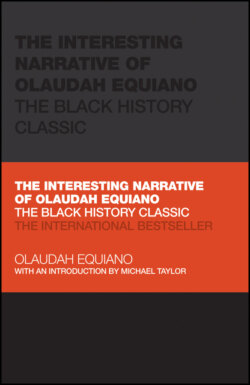Читать книгу The Interesting Narrative of Olaudah Equiano - Olaudah Equiano - Страница 12
EQUIANO THE CHRISTIAN
ОглавлениеBesides slavery, the second great theme of the Narrative is Christianity. As such, it falls squarely within the genre of spiritual autobiography, and Equiano sought explicitly to immerse himself in the same religion that was practised by his readers. Though his faith was no doubt sincere (he fondly recalls his conversion and later baptism in the year 1759), it was also a rhetorical device to remind his readers that all Africans, such as he, were capable of Christian piety and British civility. Perhaps of even more relevance, Equiano's Christianity was pointedly Protestant and often hostile to Catholicism. When sailing the Mediterranean, for instance, he decries the Portuguese Inquisition and its prohibition of lay readership of the Bible. He is equally unimpressed with Catholic rituals in Porto: ‘I had a great curiosity to go into some of their churches’, he writes, ‘but could not gain admittance without using the necessary sprinkling of holy water at my entrance … I therefore completed this with ceremony, but its virtues were lost on me, for I found myself nothing the better for it’.
Along the coast at Malaga he despairs of bullfighting, but not of its barbarity: rather, the offence is the performance ‘on Sunday evenings’. It was therefore easy for Equiano to spurn the advances of Father Vincent, a ‘popish priest’ [sic] as he put it, who wished Equiano to study in a Spanish seminary. Writing for his mostly Protestant audience, Equiano ‘could not in conscience conform to the opinions of his Church’. However, this Protestantism was heartfelt. When preaching to the peoples of the Mosquito Cost, Equiano took with him that canon of anti-Catholic fervour, Foxe's Book of Martyrs, replete with its gruesome woodcuts of ‘papal cruelties’ that were inflicted upon Reformed Christians in the sixteenth century. It would be wrong to ascribe this explicit Protestantism as a function of religious bigotry. More likely, it was another device to make plain Equiano's acquired Britishness: before the Jacobin espousal of deism in the 1790s, Britons defined Frenchmen by way of their Catholicism as much as their absolutism, and it followed that any good Briton was an equally good Protestant.
Equiano makes frequent references to the Israelites of the Old Testament. In the first chapter, he writes of ‘the strong analogy which … appears to prevail in the manners and customs of my country and those of the Jews, before they reached the Land of Promise’. Later, when first reading the Bible itself, Equiano is struck by the similarity of the Levitical exegeses to the customs of his homeland. The liberation of enslaved Africans seems to him the natural sequel to the exodus from Egypt and the escape from Babylon; just as songs of sweet chariots resounded in the fields of the antebellum South, the victims of British slavery imagined themselves as Israelites awaiting freedom. It was not coincidence that, on the body of Quamina Gladstone, the leader of the 1823 enslaved uprising in Demerara, the British authorities reportedly found a Bible marked at Joshua 8:1: ‘Take all the people of war with you, and rise’.
Equiano's equation of British slaves with the Jews of Exodus also played into the contemporary fashion to imagine Britain itself as the heir of Israel. Handel's oratorios for George II were based on the legends of Esther, Deborah, and Zadok the Priest; pamphleteers celebrated the British victory over the French in the Seven Years’ War as the triumph of the Israelites over the Moabites; and even the radical William Blake wrote of founding a new Jerusalem. Most happily of all, for Equiano these Biblical comparisons could merge in patriotic abolitionism.
